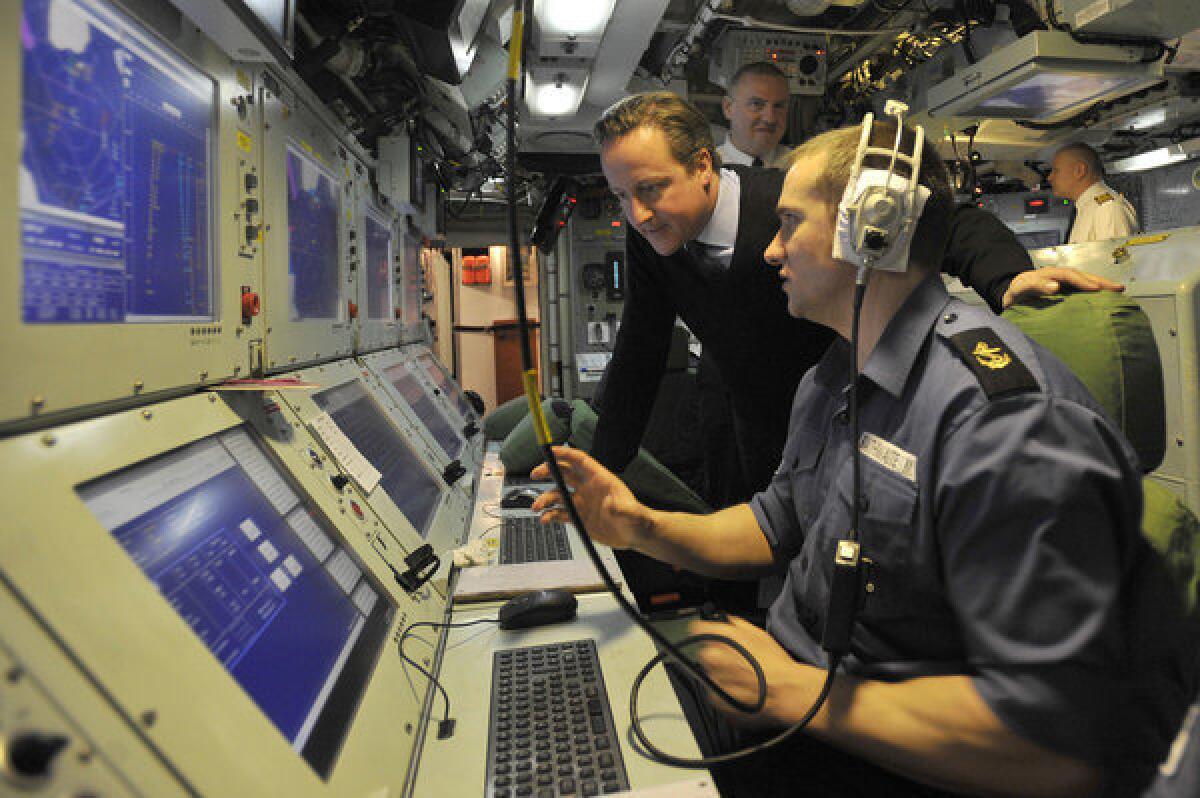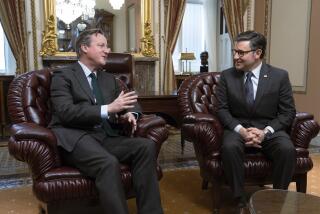Prime Minister Cameron argues to keep Britain’s nuclear arsenal

LONDON – Amid international alarm over saber-rattling by North Korea, British Prime Minister David Cameron made an impassioned defense Thursday for maintaining his country’s independent nuclear deterrent, despite growing domestic complaints of excessive cost during an era of drastic budget cuts.
Cameron said that atomic threats to Britain’s security are now even more worrisome than during the Cold War because of rogue states such as North Korea and Iran, both of which are believed to be trying to develop nuclear weapons.
“North Korea does now have missile technology that is able to reach, as they put it, the whole of the United States,” Cameron said. “If they’re able to reach the whole of the United States, they can reach Europe, too. They can reach us, too.”
He described Britain’s submarine-based nuclear deterrent as an important part of its “insurance policy” against the kind of risks presented by an unstable regime such as North Korea. U.S. officials, however, have questioned whether Pyongyang, in spite of its bellicose rhetoric, is yet able to build either a nuclear warhead that can fit on a missile or a missile that can accurately target U.S. shores.
Cameron’s comments came on a visit Thursday to Scotland, the home base for Britain’s controversial Trident nuclear defense program, consisting of four submarines that carry nuclear warheads.
Cameron is committed to replacing the aging Trident fleet, an endeavor estimated to cost at least $150 billion, even as his Conservative government enacts the most draconian spending cuts Britain has seen in a generation, much of it directed at the social welfare system.
Criticism of the plan to overhaul Trident has come not just from the opposition Labor Party but also from the Conservatives’ partner in the coalition government, the Liberal Democrats, who want to explore alternatives to the current “round-the-clock” sea-based nuclear defense program.
Cameron is also aware of the strong opposition to Trident among Scots, who will vote next year on whether Scotland should secede from Britain and become its own nation. The nuclear issue is likely to figure in the “Yes” campaign spearheaded by the Scottish National Party, which has vowed to expel British submarines from Scotland’s waters if it forms the government of a newly independent state.
Cameron’s visit Thursday to shore up support for Trident coincided with the publication of an opinion piece by him in the Daily Telegraph in which he said that the nuclear threat to Britain had not vanished.
“In terms of uncertainty and potential risk, it has, if anything, increased,” Cameron wrote, citing the “highly unpredictable and aggressive regime” of North Korean leader Kim Jong Un.
“Does anyone seriously argue that it would be wise for Britain, faced with this evolving threat today, to surrender our deterrent?” Cameron said. “My judgment is that it would be foolish to leave Britain defenseless against a continuing, and growing, nuclear threat.”
Maintaining its own arsenal of nuclear weapons has historically been a vexed issue in Britain.
The Labor Party once supported unilateral disarmament but eventually retreated from that position in the face of clear voter rejection of such a policy. It now backs an independent deterrent for Britain, despite its criticism of Cameron’s insistence on upgrading the Trident system without a clear budget plan.
ALSO:
Egypt moves to block access to pornography
Argentina mourns as flooding death toll rises to 55
Hackers apparently break into North Korean social media sites
More to Read
Start your day right
Sign up for Essential California for news, features and recommendations from the L.A. Times and beyond in your inbox six days a week.
You may occasionally receive promotional content from the Los Angeles Times.







